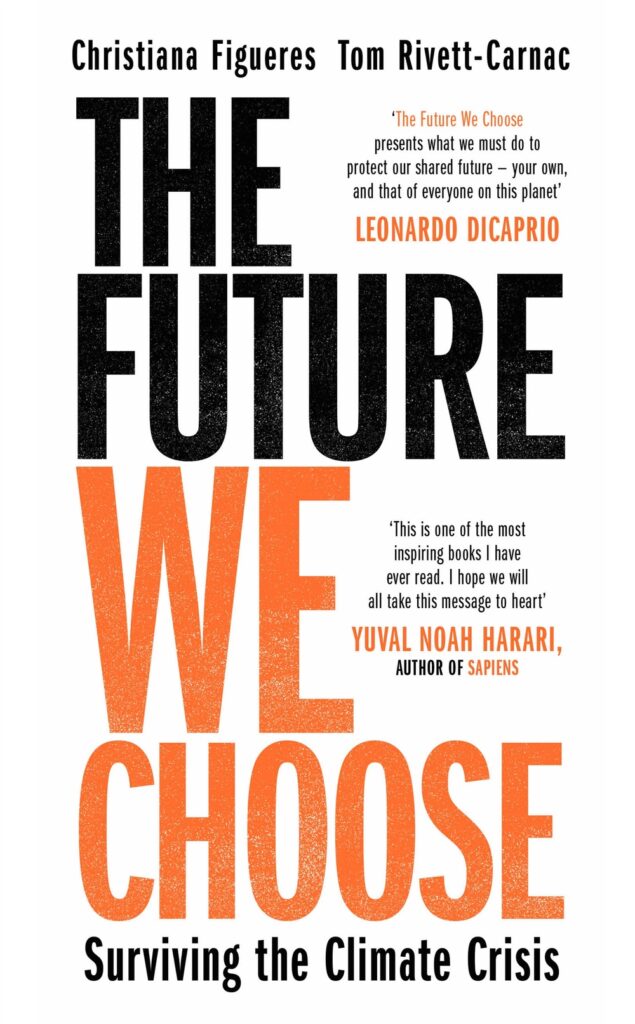Sharing my learnings from the book, Future We Choose by Christiana Figueres & Tom Rivett-Carnac
Future We Choose by Christiana Figueres & Tom Rivett-Carnac
In The Future We Choose, Christiana Figueres and Tom Rivett-Carnac—who led negotiations for the United Nations during the historic Paris Agreement of 2015—have written a cautionary but optimistic book about the world’s changing climate and the fate of humanity.
The authors outline two possible scenarios for our planet. In one, they describe what life on Earth will be like by 2050 if we fail to meet the Paris Agreement’s climate targets. In the other, they lay out what it will be like to live in a regenerative world that has net-zero emissions. They argue for confronting the climate crisis head-on, with determination and optimism. The Future We Choose presents our options and tells us what governments, corporations, and each of us can, and must, do to fend off disaster.

- Not all of us witness the direct effects of climate change on a daily basis, but most of us are aware that the world today is quite different to how it was decades ago. The next decades are critical if we want a fighting chance of saving humanity from the worst effects of climate breakdown.
- There are only 2 choices: do something or do nothing. Whichever path we take, our actions will impact us and all generations to come.
- This is our future, regardless of whether we achieve the main target of the 2015 Paris climate agreement. And once we reach a point where we can no longer control the warming, other tipping points follow.
- We can create a sustainable future, but we’ve had to make some big changes
- cut our carbon emissions by half every decade starting in 2020 so that in 2050, we’re at net zero
- a billion people in remove areas were still living without electricity. Now, they can produce their own, enabling them to make improvements to education, healthcare & sanitation
- people are more focused on their local communities. Neighborhoods buy food together as a unit.
- To solve the climate crisis, we must believe, wholeheartedly, that it’s a problem we can fix.
- The sense of competition is everywhere in our society. All too often, we see everything in life as a zero-sum game, where if you’re not winning, you’re losing. The zero-sum game worldview is uninspiring. It also creates scarcity where there isn’t any.
- To address this, we should adopt an attitude of abundance and shift our focus toward collaboration. Abundance means recognizing that there are lots of ways in which everyone’s needs can be satisfied so that we all win.
- The instinct to strive for more has been a part of human society for centuries. But many of our planet’s resources are finite and we’re approaching a point where just taking will no longer be possible. Now is the time to replenish what we use and connect with nature so that future generations can experience the same abundance that we enjoy today.
- To start the shift toward a regenerative mindset, we should:
- focus on replenishing and nourishing ourselves. (E.g., meditation)
- reneration in nature allows species or a biosystem to heal and recover from human extraction, pressure or influence
- regenerative policies can make huge differences to our environment
- we’ll need to rewind forests and oceans by actively reintroducing native species and planting trees and shrubs in deforested areas
- To create a livable world, we must take brave steps forward and turn away from the past.
- Nature and technology don’t normally go hand in hand, yet technological advances could prove an excellent tool in the fight against climate change
- self-driving electric cars produce lower emissions than traditional cars
- plant-based and lab-grown meat alternatives greatly reduce impact of agriculture on global emissions by switching production from land to laboratory.
- artificial intelligence is likely to play an important role in almost every sector
- Through simple action of planting more trees, we can help large parts of the earth achieve stable rainfall, more fertile soil and increased production from farmland
- Consumerism is running rampant. It’s time to change your consumption patterns
- fashion industry is a problem because of its enormous carbon footprint 0 2nd only to the oil industry
- buying lots of things is not only addictive, it’s psychologically unhealthy too.
- we can choose to spend money wisely. In terms of fashion, buying better quality clothes made from organic cotton, buy from those that are committed to sustainability. Consider buying electric the next time you need to replace your car. Give your house an energy audit and time your transition to electric heating when you’d need to replace your old boiler.
- On average, lies spread 6 times faster than the truth. That’s because each of us is subject to something called confirmation bias (the desire to have our own beliefs proven right). If you can make an effort to sort facts from pseudoscience, you can engage in political action that contributes to a better future.
- inspire change through non-violet political protest
- fixing the climate crisis by supporting more women leaders


Leave a Reply